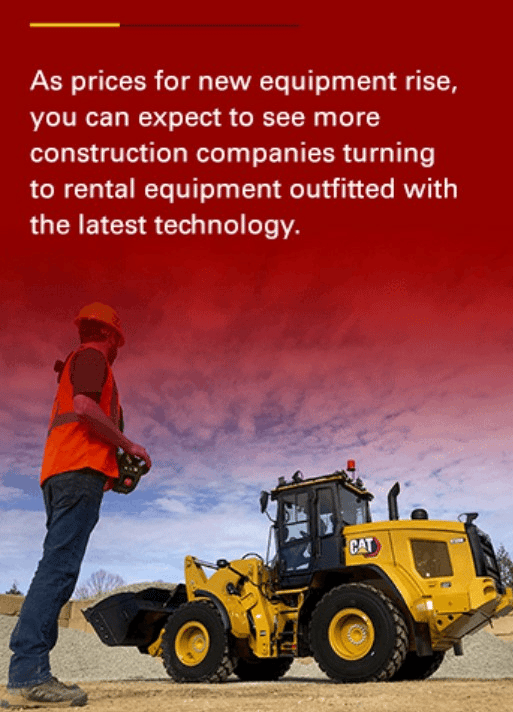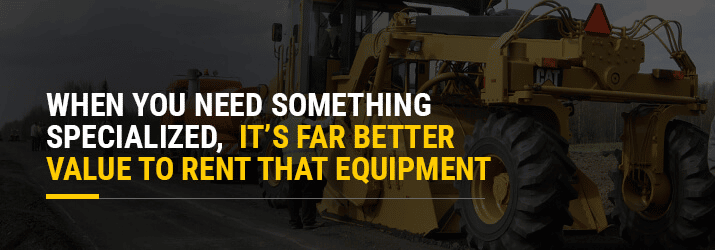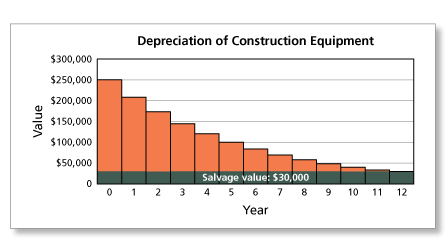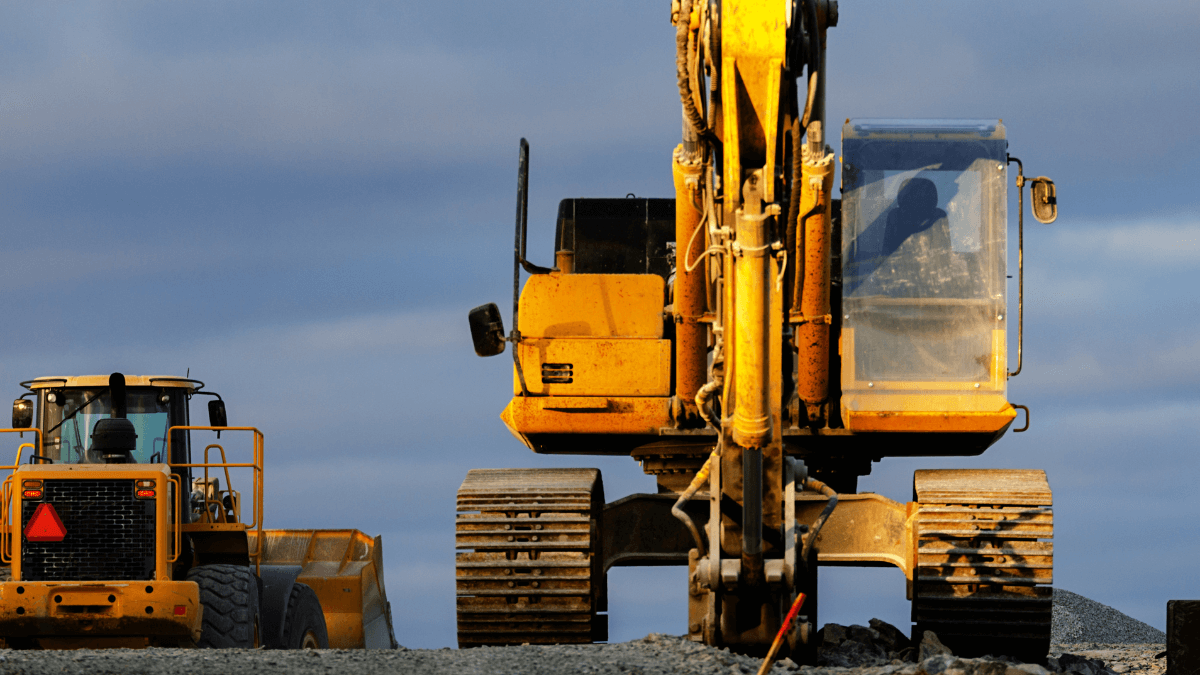Working as a contractor involves countless decisions, such as which project to bid on, how to approach a build, or how to best implement safety procedures.
One of these major decisions is whether to rent or purchase equipment.
The answer might seem obvious—purchasing equipment is surely cheaper in the long run, isn’t it?
However, depending on the size of your company, its needs, and the state of the market in your area, in certain cases renting construction equipment might prove the wiser option.
When construction equipment is rented instead of purchased, you have the opportunity to try out the machinery before buying it.
This allows you to take advantage of new technology without the risk of investing in ineffective items.
As a result, you can place your company in competition for more contracts, while protecting yourself from equipment depreciation and potentially expensive maintenance costs.
Let’s examine each of these benefits of renting equipment in more detail.
In this article...
Trying Equipment Out Before Buying It
The opportunity to try new models before making a buying decision is a major advantage of renting rather than buying construction equipment.
Renting can be compared to auditioning a machine. It allows all of your operators to try the machine out in a variety of conditions and then share their feedback.
If your team members do not feel the equipment performs effectively for your company, their comments can steer you toward a better fit.
For example, if you discover that an excavator you’re renting is slow and inefficient in removing the clay-heavy dirt in your area, you can correct this without burdening your employees for years with an expensive but unhelpful tool that requires expensive payments and plenty of maintenance.
Renting equipment temporarily before buying a necessary replacement machine might also help your company weather difficult but temporary market conditions.
For instance, if fuel prices spike like they did in 2022, renting electric equipment for a few months until they drop again can help your company’s bottom line by “removing the need for refueling, which is significant considering current gas and diesel prices,” as the VP of Sunbelt Rentals, Brad Coverdale, points out.
In addition, equipment rental can help you, your team, and your decision makers choose between models and manufacturers.
Collecting data on competing equipment is invaluable when it comes to making a long-term purchase decision.
Taking Advantage of the Latest Equipment
The adoption of new technology in the construction sector may not run as quickly as that in other industries, but that’s partially because much of the equipment is expensive, made of heavy materials, and often subject to a great deal of vibration and harsh elements.
Delicate computer components rarely fare well in such conditions, and extensive testing is often necessary before a new version of a product is market-ready.
Because of all this, replacing construction equipment can also require major investments, including down payments and financing costs.
By renting equipment, your construction company can enjoy all the industry’s latest safety features and efficiency innovations without committing to purchasing a machine that will likely require technological updates before its usefulness is through anyway.
Since even the development of construction technology tends to outpace payment schedules in the 21st century, renting ensures access to cutting-edge equipment, and avoids forcing you to constantly lag behind your competition.
Renting rather than buying can also help your company stay within safety codes more easily.
Moreover, as the visual featured below indicates, the entire American economy is currently experiencing exponential and crippling inflation.

With a long-term housing and labor shortage continuing to compound economic struggles still ongoing in the wake of COVID-19, rising prices for new and efficient equipment compel contractors to allot more and more resources in their budgets to machine replacement.
Renting helps keep those expenses in check, while still allowing contractors to keep their equipment up to date.
Additionally, renting construction equipment means that more room is available for insurance negotiation—for instance, you might opt for whole-fleet rental insurance rather than an expensive monthly policy on each individual high-tech item.
This is especially of note when new machines require intricate and highly technical computer repairs that not every team member can perform.
Your company could also save money on the kind of maintenance that requires specialized knowledge.
Bidding on More Construction Projects
How can rented construction equipment allow more flexibility in project bidding? When your fleet is limited, so are the kinds of jobs available to you.
For example, if a project for which your company otherwise qualifies requires a paver, which you don’t have, you can obtain it without making a too-large investment by renting.
You can even swap out the excavator you’re not using at the moment for the paver or any other piece of equipment that the potential client needs.
Consider this:

According to For Construction Pros, some rental equipment is chargeable to the job rather than your company, which certainly boosts your profit margin.
Consequently, your company escapes maintaining payments on any equipment that it only uses rarely.
Keep in mind that establishing good relationships with construction rental equipment companies means that you stand a better chance of securing what you need at a better rate.
Another scenario is using equipment rental to avoid becoming a victim of your own success.
What do we mean by that? Let’s explain!
Suppose your company constructed a home on a pre-cleared subdivided plot of land, and the client was so satisfied with your work that they later offered another job that involved clearing a parcel situated deep in a wooded area, on a completely different terrain from the house.
Let’s also assume that your company normally only bids on construction projects within a certain radius, but your client wanted a contractor they trusted and offered a premium price for the service.
How would your company handle this situation?
It might seem tempting to make do with the equipment you have for a higher profit, or to choose the convenient option of taking on a subcontractor for the work your team is unable to complete.
However, as long as you have employees with the expertise to complete the land clearing and can prepare the plot yourself, renting the machinery you need allows you to strengthen your relationship with a valuable client while also keeping costs down.
Being Safe From Equipment Depreciation
Any piece of construction equipment will likely be difficult to sell after just a few years, as the type of heavy work that construction involves, as well as the harshness of the elements, quickly take its toll.
Have a look at this graph for a good idea of the steep average depreciation of construction equipment.

It shows that by the 10th year of ownership, your machine is not only well out of date, but also that what it’s worth barely extends to its salvage value.
Nevertheless, it can be difficult to part with trusted equipment your long-time team members are familiar with.
After using it for a while, they understand the machine’s quirks and they can diagnose and even quickly repair most problems.
However, while calculating a machine’s life cycle can prove complicated and sometimes subjective, construction equipment loses its resale value relatively quickly.
It’s also common to sink a lot of time and resources into deciding whether to replace, repair, or retire valuable construction assets that are teetering on the edge of their useful life.
Renting construction equipment protects your company from having to keep track of depreciation and useful life.
So, especially if you and your team rarely use a certain piece of equipment, it’s best to rent it for the duration of a job.
And, as they point out at Contruction21, your bottom line will not suffer a hit. The depreciation costs will all be absorbed by the rental vendor.
Not Having to Maintain the Equipment
Contractors are not responsible for repairing rented construction equipment. Rented construction equipment arrives at your worksite well-maintained and ready to go.
Since they don’t have to worry about the condition of the equipment as much, contractors save money and resources on preventative maintenance and major repairs.
There is also condition-based maintenance, which refers to malfunctions and breakdowns that are unpredictable and can manifest themselves during daily inspections or regular maintenance.
Repairing them can quickly become costly.
However, if they occur while you rent, the rental company is also responsible for quickly finding a replacement for your team.
Maintaining valuable construction equipment also means securing, storing, and transporting it.
This is often a logistical nightmare, in addition to being expensive. How can a small loader make its way 75 miles to a construction site?
Equipment designed for minor jobs or tiny spaces, as well as lumbering assets that aren’t able to reach highway speeds, require transportation on a flatbed truck or similar vehicle.
Safely transporting your equipment while also protecting its attachments and cabs often requires maintenance and a budget of its own.
Even when equipment such as a cement truck can make its own way to a build, this tends to require a great deal of fuel.
In addition, the burden of making decisions about using aftermarket vs. original manufacturer equipment parts also falls on the owner, along with investments and making sure to remain within the asset’s warranty.
If your front office team is small or you prefer to concentrate your resources elsewhere, such as laborer wages or first-class safety equipment, it’s an easy choice to leave these matters for another company.
Renting offers contractors all the benefits of brand-new equipment without their usual accompanying headaches.
Conclusion
Contractors and project managers who rent construction equipment stand to benefit in a number of ways.
Their teams are able to try out and assess an expensive asset before buying them.
Renting also presents the possibility of temporarily taking advantage of cutting-edge equipment that would otherwise be outside of your company’s purchase range.
You expand your company’s flexibility and ability to bid on more construction projects when turning to renting, and using the equipment owned by others spares your budget from bearing the high costs of depreciation.
Finally, a construction company that rents its assets avoids heavy, unexpected repair bills, as well as the continuous costs of maintaining equipment.





